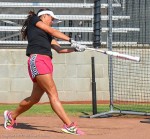2015 is the year when the cracks in the glass ceiling for women in professional sports are starting to grow.
But even as the barriers to progress begin to erode, the imposing history and magnitude of opposition mean very few women in sports receive the opportunity to contribute to the evolution.
Sarah Thomas. Becky Hammon. Jen Welter.
The small trickle of women in authority positions is often accompanied by media fanfare and team celebration, but this pat-yourself-on-the-back mentality can lead to a sense of complacency among owners and head coaches if they focus so much on the individual that they lose sight of the cause.
Hammon made headlines this summer when the former women’s basketball star coached the San Antonio Spurs to an NBA Summer League championship as the league’s first-ever female head coach. Hammon’s success set a precedent followed by the Sacramento Kings when the organization hired Nancy Lieberman as the second-ever female assistant coach in the NBA.
Gregg Popovich, the longest-tenured coach in the NBA, staked his claim as one of the league’s most progressive figures in his decision to hire Hammon. But while Popovich is revered as one of the best basketball minds in the league and has deserved the praise he received, one advancement does not constitute overarching progress.
Professional sports organizations shouldn’t see the hiring of one woman as checking a box or filling a quota, enabling them to sit back and call it a day.
Oftentimes these women become tokens, called on to represent their entire gender in professional sports. In addition to creating unfair expectations of these women, the lack of female colleagues leaves them to bear the burden of the pressure without much support.
In April, Sarah Thomas became the first female full-time referee in the NFL since the league’s inception over a hundred years ago.
When asked about her historic hire, Thomas said the only reason she pursued her particular career was because she loved it, not because she set out to be a trailblazer.
Between the viral tweets and the progressive praise, people lose sight of what got these women to where they are – not their gender, but their talent.
In June, Jessica Mendoza, a former Stanford All-American softball player and two-time Olympian, became the first woman to ever announce an MLB baseball game after ESPN promoted her to an analyst from her previous job as a broadcaster.
Last week, Mendoza continued making history by becoming the first woman analyst of an MLB playoff game when she stepped into the booth for the nationally televised matchup between the Houston Astros and the New York Yankees.
While many lauded Mendoza’s achievement, as they did for Hammon and Thompson, there were others who derided her success on the basis of her gender.
Atlanta radio host Mike Bell questioned Mendoza’s knowledge of baseball since she had only ever played softball.
“You guys are telling me there isn’t a more qualified Baseball player ESPN can use than a softball player? Gimme a break!” Bell posted on Twitter.
While Bell was by far the most vocal critic, he was far from the only one. Many MLB fans voiced their disapproval on Twitter, threatening to stop watching the broadcasts on which Mendoza would appear.
Even with limited success, the representation of females in the sports industry remains proportionally low. Hires of talented women should not occur in isolated cases, but rather in institutional overhauls.
Sixty percent of women’s Division I basketball teams are coached by men, while exactly zero men’s Division I teams are coached by women.
Women make up only 27.8 percent of all full-time athletic trainers, 16 percent of athletic directors and 2 percent of men’s team head coaches.
The reason successful women like Mendoza and Hammon are attacked for doing their jobs is because there are so few women doing the same. The lack of visibility for professional women in the sports industry allows people like Bell to make uneducated and baseless comments on these individuals’ abilities.
The issue here lies not in the quality of the women in sports, but the quantity.
2015 has been a good year for women in sports, or, at least, a few of them. While five women have made major headway this year, there are thousands more who have been relegated to the sidelines.
Email Fahy at cfahy@media.ucla.edu or tweet her at @clairemfahy.
